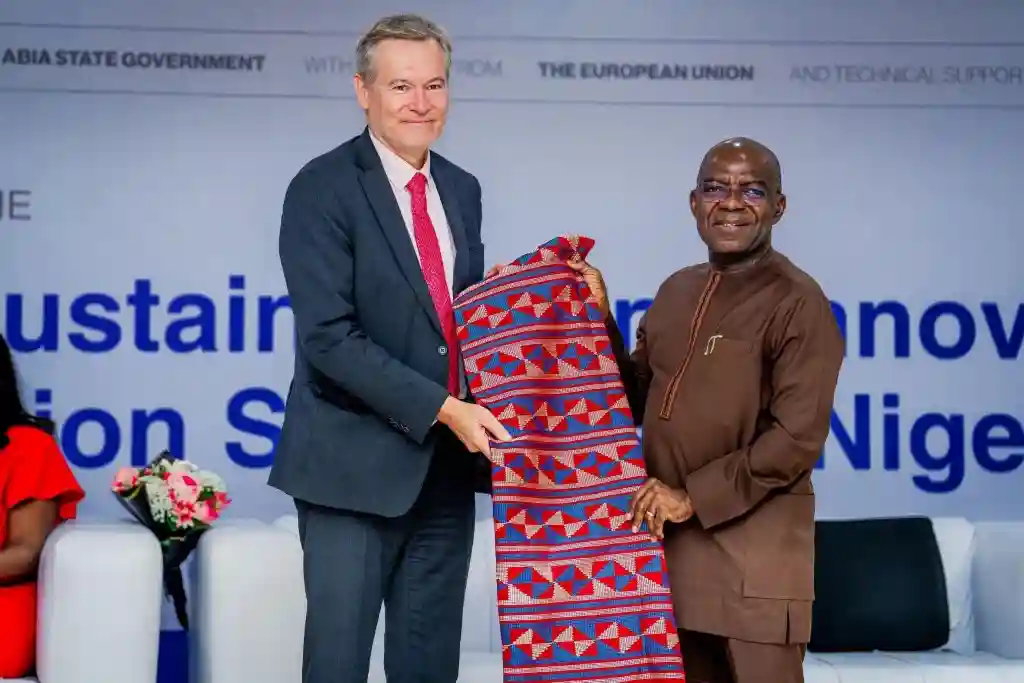The Government of Abia State, in partnership with the European Union, has formally launched the EU-funded Supporting Sustainable Social Protection System in Nigeria (SUSI) Project. The event took place on Wednesday, September 24, 2025, at the Banquet Hall, Government House, Umuahia, with Governor Alex C. Otti, OFR, leading the state’s delegation.
Governor Otti, in his address, highlighted the urgent need to tackle poverty and material destitution, pointing out the mixed results of past interventions. He expressed optimism about the project and its potential to strengthen social protection systems in the state. According to him, “It is gratifying to see that we are now focusing on strengthening institutions and building resilient systems to drive social protection programmes in this part of the world. May I use this auspicious occasion to express the collective gratitude of the Government and people of Abia State to the European Union (EU) for its committed support to the social and economic development of the State and other parts of Nigeria.”
He noted that the EU’s interventions in sectors such as health, education, energy, environment, and targeted support for vulnerable populations had improved the lives of thousands across Nigeria.
The governor paid special tribute to the EU Ambassador to Nigeria and ECOWAS, Mr. Gautier Mignot, and his predecessors, appreciating their commitment to Nigeria’s growth. He said, “I want to graciously thank Your Excellency for the choice of Abia as one of the pilot states for the SUSI Project. We count this thoughtful consideration as another proof of your goodwill to the people of Abia whose gratitude we may not be able to fully convey here.”
He further emphasized the state’s readiness to support the project fully, assuring the EU team of open communication.
The launch was also attended by representatives of the International Labour Organisation (ILO) and the United Nations Children’s Fund (UNICEF). Governor Otti welcomed their involvement, describing it as a clear sign of international confidence in Abia’s commitment to social development. “Your presence has not only given an important sheen to a colourful ceremony, it has sent an unambiguous message to the world that Abia is seriously committed to partnering with multilateral development institutions to achieve aspirations that protect and restore the dignity of the human person,” he said.
The governor added that their collaboration would not only strengthen the project but also build local capacity through knowledge exchange. He projected that the benefits of this partnership would extend beyond the 36-month life cycle of the project.
Outlining his administration’s philosophy on governance, Governor Otti explained that poverty and deprivation were not isolated problems but the result of multiple interconnected factors, including global economic challenges, inflation, pandemics, and failures in public institutions. He stressed that effective solutions required data-driven policies, institutional accountability, and structured systems tailored to different demographics.
“We do not treat poverty and social deprivation as isolated events; it is the combination of several factors, many of which are beyond the control and remediation of the average person,” the governor explained.
He cited the establishment of agencies such as the State Ministry of Poverty Alleviation and Social Protection, the Abia State Commission for the Welfare of Disabled Persons, and the Abia State Senior Citizens’ Centre as evidence of his government’s institutional approach. He also noted that personnel were carefully selected to lead these agencies, showing the seriousness of the state’s efforts.
The governor highlighted policies already in place to support the general population, including free and compulsory basic education, health insurance for the elderly, and investments in infrastructure. He also mentioned cooperative support schemes for micro-businesses, especially in agriculture, and intervention programs such as cash transfers, medical provisions, and food supplies to families facing emergencies.
On youth empowerment, Governor Otti pointed to training initiatives in ICT, fashion, sports, and creative crafts. “By the end of August 2025, more than 5,000 young men and women in rural and urban communities have successfully participated in one or a few of our multiple capacity development and empowerment programmes,” he said. He stressed that education remained central to his administration’s strategy, with the sector receiving the largest share of the state budget in the last two years. This, he explained, led to the recruitment of over 5,000 new teachers, infrastructure upgrades in schools, and improved welfare for staff.
The governor noted that the SUSI Project would help expand the state’s social safety net and consolidate gains already made in poverty alleviation. “The introduction of the EU-funded SUSI initiative would greatly enhance our capacity to build on the gains that have been made on the social protection front in the last 28 months,” he said.
Governor Otti used the occasion to commend the Commissioner for Poverty Alleviation and Social Protection, Mrs. Ngozi Blessing Felix, and the planning committee for their role in organizing the event. He expressed satisfaction with the technical competence of the ministry and related agencies, while encouraging them to continue improving.
“I am also optimistic that the recently inaugurated Social Protection Council will further broaden the scope and reach of our efforts to cater for vulnerable groups across communities within the State,” he said. “Even then, as I have said on few occasions, nothing is so good that it cannot be improved upon. We are all encouraged to keep our eyes on the ball at all times, refuse the temptation to be distracted and constantly remind ourselves that we are not working for ourselves but for the men and women who have trusted us with the privilege of leadership.”
The SUSI Project, backed by the EU with the support of the ILO and UNICEF, is designed to strengthen social protection systems in Nigeria, with Abia State as one of the pilot locations. The project aims to address structural challenges, expand access to social safety nets, and ensure sustainable support for vulnerable populations.
Governor Otti reaffirmed Abia’s readiness to lead by example in this national initiative, stressing that the project will offer the state new opportunities to reduce poverty, build resilience, and improve human dignity.

